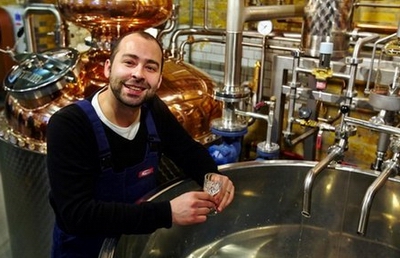In a converted warehouse in south-west London, gentle bubbling and trickling sounds can be heard and there is a heady aroma in the air.

The smell is a spirit, currently 70% alcohol, which has just been boiled in a shimmering copper and stainless steel still. The vapour pipes through a condenser and the alcohol is dripping through a tap into a steel rolling vat.
Over the other side of the room, a more yeasty odour lingers, where a giant lauter tun stand and the fermentation process has been taking place over the past week.
The copper whisky still is called Matilda, affectionately named after The London Distillery Company founder Darren Rook's Scottish grandmother.
Last month, the firm, based in Battersea received approval in writing from HM Revenue and Customs (HMRC) to make Plain British Spirit.
"It is not widely known that the capital has a great heritage of whisky production dating back to before Chaucer," says Mr Rook, aged 32.
Yet following a crash in the market, the capital's last whisky distillery, the Lea Valley Distillery, where the Olympic site now stands, closed in early 20th century.
In recent years there has been a boom in whisky distillation in parts of the USA and Australia. A few years ago The London Distillery Company's co-founders pondered why London was without one.
Until the 1990s whisky stills had to have a greater volume than 1,800 litres - the size deemed too big to fit onto a horse and cart.
But the law was then amended to allow consideration of smaller distilleries on commercial grounds.
Initial plans for the London distillery were made in 2010, but it took its founders three years to find a site, build the distillery, get the necessary approvals, and raise funds - partly through crowdsourcing.
Head Distiller Andrew MacLeod Smith, 30, is originally from Aberdeen, but cut his teeth in the industry working in New York's whisky bars before studying distilling in Edinburgh.
"Building the distillery was the easy part," he says. "Now comes the hard part - making the spirit.
"It's important to respect the science," he says. "The trick to making a good whisky is to pay attention to every part of the fragile process."
"The smallest variations have a huge impact."
So how does he hope the end product will taste?
"We want it to be a little fruity, light, but also having a hearty maltiness and a chocolaty caramel note."
This whisky is also unique to the UK in the fact it falls outside the remit of the Scottish Whisky Act, giving the producers some license to experiment - for example its barrels could be made from wood other than oak.
For its first run, the firm has used English oak barrels, made by the last English master cooper Alastair Simms.
Mr Rook, who worked in Newcastle cocktail bars before joining the Scotch Malt Whisky Society, also says "safety is paramount" after a number of reported fires at whisky distilleries in recent years
Of course, success is not guaranteed and the firm are entering a highly competitive market.
Despite Scotch whisky exports growing by 11% in the first half of this year, the whisky industry is saw profits growing at only around half volume growth.
Mr Rook thinks a growing trend for people looking for local produce will be key to the distillery's success.
"We think people will buy into the idea of a craft distillery, which makes whisky from the start to end of the process," he says.
For now, those keen to sample amber liquor will have to wait.
The spirit needs to be aged for at least three years and one day to become whisky.





